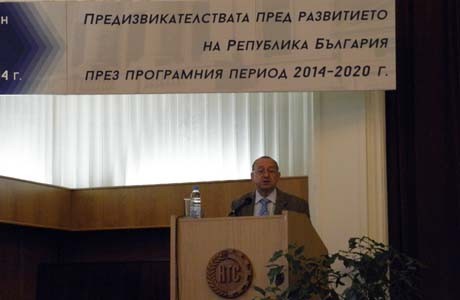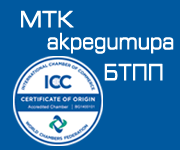Назад
Назад
Challenges in the development of Bulgaria for the 2014-2020 programming period
Innovations should be among the priorities to our country in the new programming period 2014-2020. This was the consensus of the participants’ opinion at the National Forum “Challenges in the development of the Republic of Bulgaria for the 2014-2020 programming period”, realized by the Federation of the Scientific and Technical Unions in Bulgaria (FSTU), in cooperation with the Bulgarian Chamber of Commerce and Industry, and other non-government organisations.
Deputy Minister of Economy and Energy Anna Yaneva made an overview of the goals and objectives to be fulfilled by Bulgaria in the new programming period 2014-2020. “The vision on the development of the Bulgarian economy till 2020 includes achieving a smart, sustainable, united and regionally balanced economic growth in order to increase the living standards by introducing competitive education and training; by creating conditions for quality employment and social commitment; ensuring favorable business environment and investment promotion, applying innovative solutions and increasing the resource efficiency; ensuring affordable and good healthcare”. She also pointed out that, in the short term the activities of the Ministry of Economy and Energy cover the implementation of several key tasks, including the promotion of the SMEs by facilitating their access to financing, internationalization, trainings and innovations.
“The Bulgarian Chamber of Commerce and Industry is an organisation which aims at the pragmatic approach and works to support companies”, underlined Tsvetan Simeonov, President of the BCCI. He outlined the difficulties that both the Bulgarian and the foreign investors are faced with – the heavy administration and related corruption; rather the dynamic legislation in recent years; the limited access to financing.
In terms of the Labor Code the President of the Chamber noted that it is not balanced and that there are a lot of formalities, which are generally performed by the small companies, thus creating preconditions for corruption.
The Labor Code has another disadvantage – by no means may the employer unilaterally terminate a contract, in contrast to the employee who may do so by one month’s notice. On this basis a virtual leakage of specialists from one establishment into another is being created, considering the fact that investment in training and qualification of the employee is made.
“Unless Bulgaria copes with this urgent problem – corruption, and administration impunity, then good results cannot be expected”, added Mr. Simeonov.
14.03.2014
Още новини:
-
10-03-2014
-
07-03-2014

 1 USD =
1 USD =  1 GBP =
1 GBP =  1 CHF =
1 CHF =  ISO 9001:2015
ISO 9001:2015





























